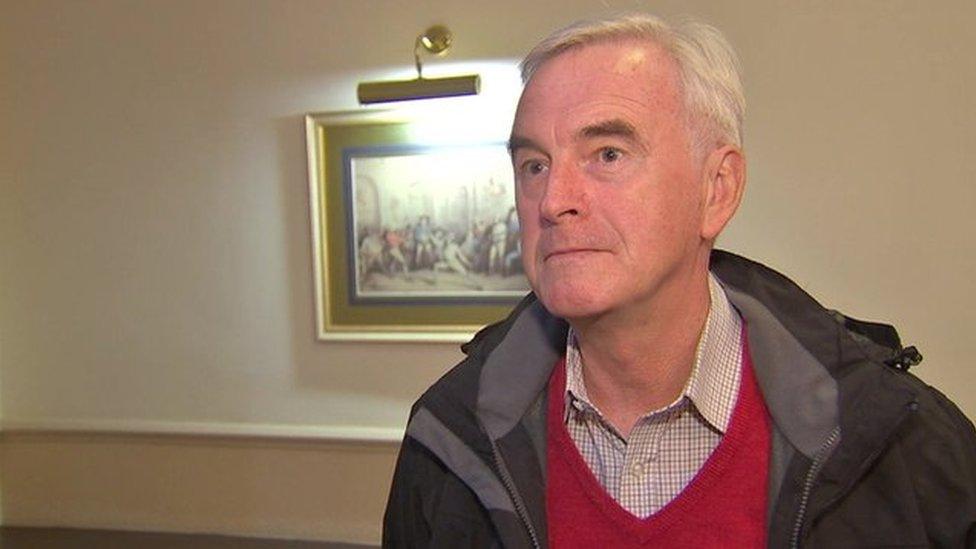What should business make of John McDonnell?
- Published
- comments

This morning, business leaders woke up to the fact that the shadow chancellor is a man who has argued in the past for the nationalisation of the UK's banking system, a 60% top rate of tax for those earning over £100,000, higher taxation for the City, caps on high pay, a rapid expansion of public ownership and a "removal" of the "monopoly of the big six energy companies".
He is also opposed to a third runway at Heathrow, an infrastructure project supported by many businesses.
John McDonnell's Who's Who entry talks of "generally fermenting the overthrow of capitalism". He may have meant fomenting. Or maybe he was making a home brew joke.
To put it mildly, Mr McDonnell is certainly a different character from Ed Balls, his predecessor.
Many business leaders are sure to feel very uncomfortable with Mr McDonnell's "radical agenda".
And will fear that a general "anti-business" sentiment will now radiate from the opposition benches.
Inequality
Mr McDonnell has spoken about Britain being a "corporate kleptocracy".
Those on Mr McDonnell's side argue that, given the mess of the financial crisis, it is high time there was a radical reappraisal of the way markets work and a new look at ways of tackling inequality.
At this stage, many business leaders will hold their counsel.
One I spoke to last week on the prospect of a Jeremy Corbyn victory in the Labour leadership contest said simply that many of his colleagues did not believe he could win a general election.
And at a business dinner I attended with chief financial officers in the retail sector, most expressed a similar view.
So, although the impact of a Labour victory would undoubtedly be significant on many businesses across the UK, the probability of that happening - according to those same businesses - is low.
Belief
It was different when it came to Ed Miliband. Before the 2015 general election, many businesses believed that he could be the next prime minister.
That was why the share price of the energy companies fell sharply when Mr Miliband announced in 2013 that a future Labour government would freeze the price of retail energy bills.
Share price volatility is less likely this time as many investors also do not believe that Mr Corbyn will be prime minister. And that means that Mr McDonnell will not be chancellor.
Another well-connected business figure I spoke to this morning said that it was time for caution.
He pointed out that the new Labour leadership had not published any policies and that businesses should refrain from knee jerk reactions to statements made in the past by members of the new shadow cabinet.
"Politicians say lots of things," he pointed out with half a smile.
He also said that a focus on apprenticeships and young people in employment - favoured by Jeremy Corbyn - would be something high up the agenda, particularly for smaller businesses.
As is higher levels of state investment in infrastructure.
European Union
There is then the issue of Europe.
Mr Corbyn appears less committed to the European Union than his predecessors, raising the prospect that both the Conservatives and Labour could split for and against during the referendum campaign.
Chuka Ummuna, the former shadow business secretary, said that a lack of commitment from Mr Corbyn to the EU was his reason for quitting his position yesterday.
And as David Cumming, head of equities at Standard Life Investments, argued on the Today programme this morning, if both parties are split on the issue that could increase the chances of the UK leaving.
Which wouldn't be much welcomed by the many in the City.
Of course, many other businesses believe that Britain could flourish outside the EU.
Peter Hargreaves, of the retail investment firm Hargreaves Lansdown, said in The Sunday Times, external at weekend that he would be at the forefront of the campaign for a UK exit.
For the moment, many businesses will decide that silence is the best policy when considering how to respond to the election of Mr Corbyn and Mr McDonnell.
At least until the new Labour leadership starts announcing what its policies actually are.